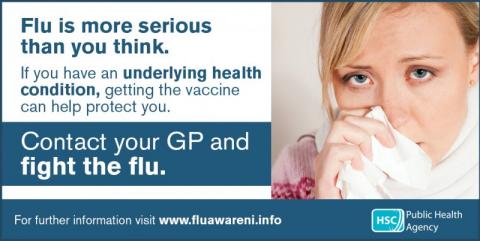Reminder to get flu vaccine as uptake rates fall

The Public Health Agency (PHA) is reminding all those ‘at risk’ to get the flu vaccine as the overall uptake for the vaccination is lower than at the same time last year.
So far this year there has been a 10 percentage point decrease in uptake by people categorised as ‘at risk’ – pregnant women and those with underlying health conditions, for example, asthma – as well as a fall (10 points) in the number of pre-school children aged over two years receiving the vaccine.
Those aged 65 and over are also eligible for the vaccination, and while there has been only a slight fall (2 points) in this group, it is still important that everyone who is eligible makes arrangements to receive it.
Dr Richard Smithson, Consultant in Health Protection at the PHA, explained: “It is vitally important that those ‘at risk’ and pre-school children get the flu vaccine as flu can be particularly serious for these groups, so they should contact their GP if they haven’t already been contacted.
“It is also important to remember that the strains of flu virus can vary from year to year, which is why you need to get the vaccination every year, so even if you received the vaccine in spring this year, you still need to get the vaccination for this flu season.
“One reason that the uptake may not be as good as last year is that it was discovered that last year’s vaccine wasn’t as effective on the virus as was hoped. However, the early indications this year show that this vaccine is a much better match for the circulating viruses and so it’s very worthwhile getting it.”
The figures also show that the uptake for primary school children is just as good as last year, which was the highest in the UK.
Dr Smithson commented: “I am delighted to see the campaign going so well in primary schools and that around 80% of parents are choosing to help protect their children against the flu. Hopefully we can improve uptake in the other groups as well so that as many vulnerable people as possible are protected.”
As it takes approximately two weeks following vaccination to reach maximum protection against flu, it is important to get vaccinated by early December. Flu vaccination clinics have already started and will continue until early December. If you wait until flu starts circulating, it may be too late for the vaccine to offer you protection.
Influenza or 'seasonal flu' is a respiratory illness associated with infection by the influenza virus. Each winter several strains of the virus can circulate, so the vaccine is made up of a number of strains to cover those most likely to be having an impact.
Dr Smithson continued: “For people in ‘at risk’ groups, flu can cause serious illness and result in a stay in hospital, or even death. Even if you currently feel fit and healthy, you may be at increased risk of flu and should receive the free vaccine.
“Everyone who receives an invitation to be vaccinated against flu should see it as a positive step in helping to protect their health and the health of others around them.”
Pregnant women are more likely to have serious illness if they catch flu, which is why they will be invited by their GP whatever their stage of pregnancy, to help protect them and their unborn baby. Health and Social Care staff are also urged to get vaccinated, to help protect themselves, their families and those they care for.
The flu vaccine does not give you the flu. It is offered as the best protection for ‘at risk’ groups because if they get flu, they are more likely to have severe illness and/or develop complications such as pneumonia, which can be life-threatening.
For more info on the flu vaccine, visit www.fluawareni.info and check out the PHA’s ‘Flu is more serious than you think’ leaflet at www.bit.ly/fluleaflet
